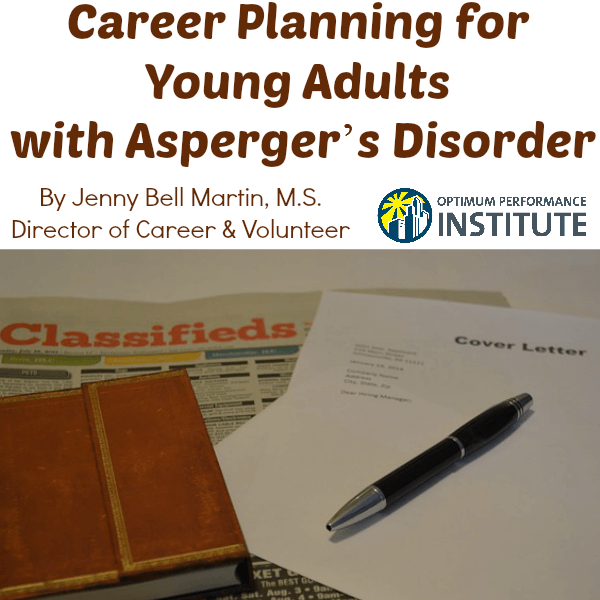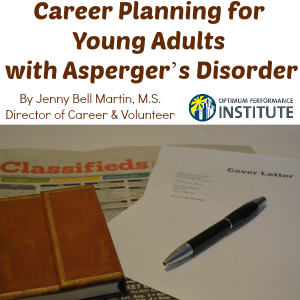
Career Planning for Young Adults with Asperger’s Disorder
 Because of the age range of the young adults that we work with, we generally see participants in the exploration phase of their career process. According to Donald Super’s “Stages of Occupational Development,” people in their late teens and early twenties are beginning to try out new experiences and different roles in relation to career paths to see if any of their childhood dreams are realistic for a career. The Department of Career and Volunteers at Optimum Performance Institute supports this process through hands-on experiences, such as volunteering and community service events, as well as through more research-based exploration with career assessments, our career workshop, and online resources. We examine the participant’s educational goals and experiences, hobbies, interests, aspirations, and past work/volunteer experiences in order to gauge realistic career paths. Regardless of diagnoses, we utilize various techniques to accommodate the ranging challenges our participants face. We have found these to be most effective when career planning with participants with Asperger’s disorder.
Because of the age range of the young adults that we work with, we generally see participants in the exploration phase of their career process. According to Donald Super’s “Stages of Occupational Development,” people in their late teens and early twenties are beginning to try out new experiences and different roles in relation to career paths to see if any of their childhood dreams are realistic for a career. The Department of Career and Volunteers at Optimum Performance Institute supports this process through hands-on experiences, such as volunteering and community service events, as well as through more research-based exploration with career assessments, our career workshop, and online resources. We examine the participant’s educational goals and experiences, hobbies, interests, aspirations, and past work/volunteer experiences in order to gauge realistic career paths. Regardless of diagnoses, we utilize various techniques to accommodate the ranging challenges our participants face. We have found these to be most effective when career planning with participants with Asperger’s disorder.
To be effective with the concrete/literal thinking often experienced by one with Asperger’s disorder, we break down each step into tangible pieces that have a purpose instead of focusing on the overall picture. We use visual maps, checklists, and calendar pages to help with organization, prioritizing and deadlines.
To increase motivation and work on the exploration stage, we capitalize on each participant’s individual strengths. If it be a school subject like Math, clients can volunteer with tutoring or mentoring. If they have an obsession with trains, participants can volunteer at Travel Town at Griffith Park. If a client has no interest in anything and refuses to work with people, we see what they can tolerate. For example, if they can tolerate animals, then we support participants with finding a volunteer opportunity socializing cats. We use these experiences to connect to possible occupations, build a resume, and build social interactions.
For rigid black and white thinking, we utilize Dialectical Behavior Therapy (DBT) skills to find the middle path. We talk about dialectics and how to consider other perspectives. We encourage participants to use “both-and” thinking instead of “either-or” thinking, and to avoid extremes like “always” and “never.”
For those with the added difficulty of social and communication skills, we work on non-verbal skills while in appointments and especially while mock interviewing. We talk about checking in with assumptions and learning to ask, “What do you mean by that?”
To support those participants who need reassurance because of the unknown, we encourage them to volunteer at locations that we partner with for community service events. If there is still a lot of fear and anxiety, we accompany the participant in their experience or reach out to the Life Coaching department to provide additional support to help them overcome failure to launch obstacles. If the young adult is interested in further researching careers through informational interviews or job shadowing, we also accompany them to ensure that all information is being recorded.
Through this process, we have seen that despite the challenges that those with Asperger’s disorder face, it does not mean that they can’t be successful in the career planning process. It comes down to the approach we use to accommodate and respond to the unique thinking styles.
For more information on OPI residential programs and our measures to help reduce Failure to Launch obstacles for young adults with Asperger’s Syndrome, call us at (888) 814-5985 or click HERE to submit an online form. We’ll be in touch promptly.
